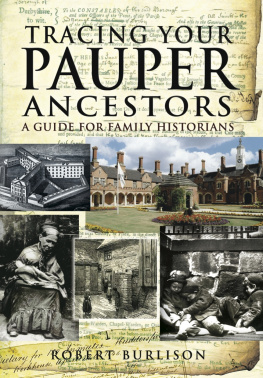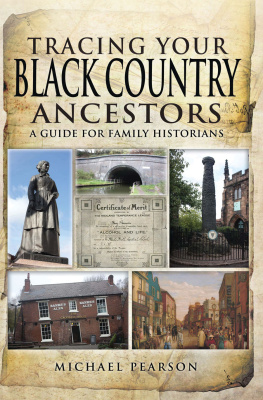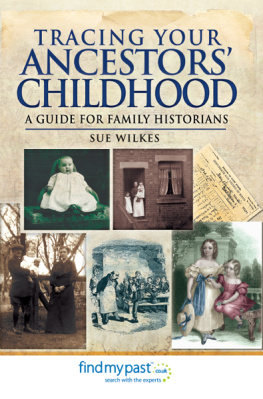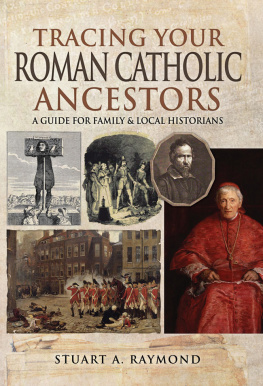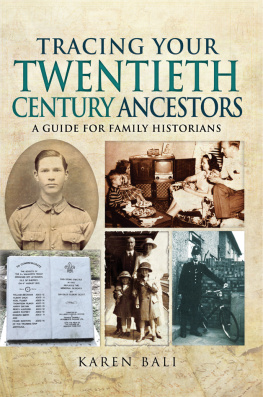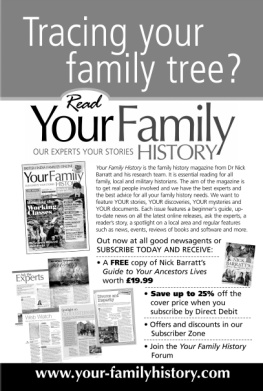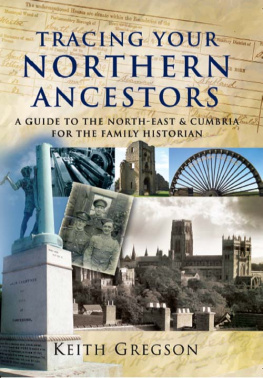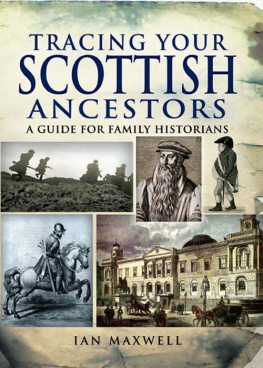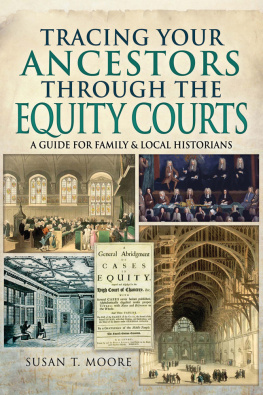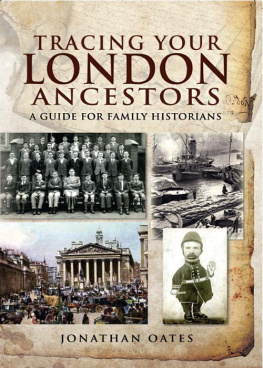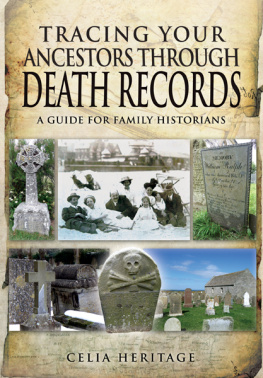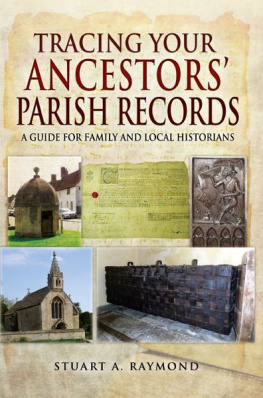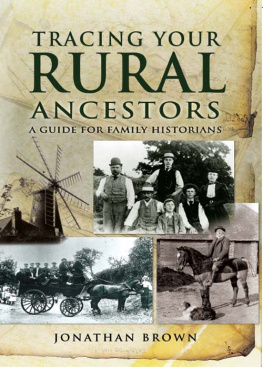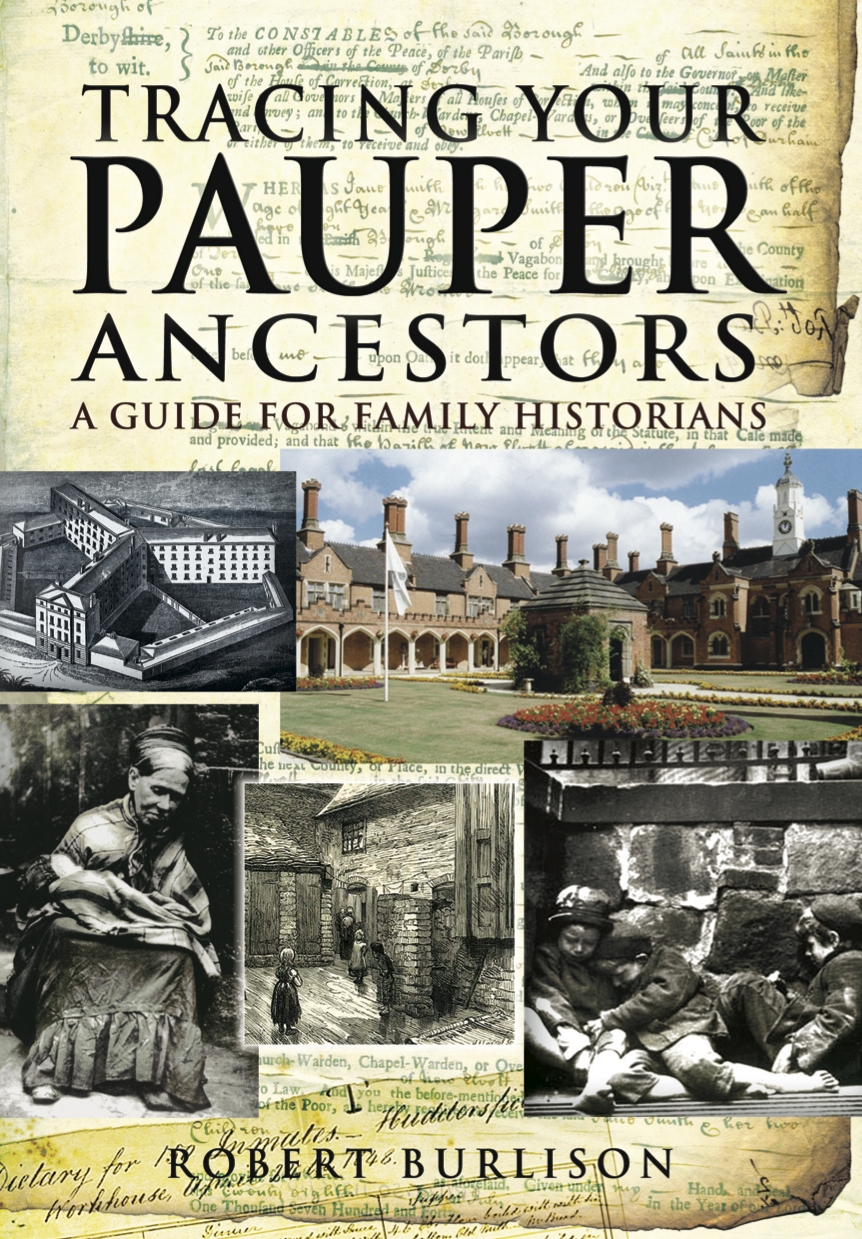First steps
R esearching your family history isnt always easy. Youll be looking for clues, asking questions, finding blind alleys, and yes, there will be a lot of dead bodies along the way. But with a bit of luck and a lot of patience you will run your man to ground. This is no truer than when searching for a poorer ancestor. Such was the stigma attached to poverty when the widely held belief was that it was the result of an individuals own idleness or unreliability that families were not readily able to accept or discuss a relatives reliance on poor-relief, their removal to the workhouse or as a recipient of charity aid. The poor too felt shamed. In Chapter 5 we read of young Charles Shaws experience of entering the workhouse when he wrote of the family, we went by the field road to Chell, so as to escape as much observation as possible.
You may well of course not know at the outset that you have a poor or pauper ancestor when they only come to light as you work your way back through the centuries. As with family history research generally, start with what you know and write it down and then see what your relatives have to contribute. Family anecdotes, recollections and reminiscences may provide clues to an ancestors position and wealth in society. Talking to the oldest of your closest relatives should be a task that is never delayed. It is my lasting regret that I was unable to discuss a branch of the familys history with my maternal grandmother when as a child I heard her all too often it seemed then recall without hesitation a seemingly intricate web of past family relationships. You will find that once people start to think over events of the past, memories often come flooding back about things that had long been forgotten. It is a sad truth that some of the older generation are ashamed of their origins, particularly if they came from a poor background and you may find that they are reluctant to divulge too much about their parents or grandparents. Even in the recent past attitudes towards divorce and illegitimacy were very different from those of today.
What you are told by an elderly relative may not always turn out to be the truth. Many a family has a romantic tale that hides a reality. Of course, you know that Uncle Mac, your great great grandfathers brother, ran away to join the circus, I was once told, which may be a tale born more out of fiction than fact. Whether or not he was a rich man, poor man, beggerman or thief the story may well have been an invention that, quite innocently, has been passed down the generations to hide some dark secret. Perhaps he was a villain of sorts and transported to the colonies, or removed in disgrace by the overseer to another parish, or entered a workhouse, or did indeed join the circus when smitten by the charms of some lion tamers daughter! But then again, a favourite way for a young man to avoid paying the parish for the upkeep of his bastard child was to run away to join the Army or the Navy.
The Internet
The Internet had revolutionised family history research. It is now easier than ever to find information or share an interest with others. Most family history societies have their own website and there are an estimated 20,000 mailing groups devoted to genealogy. National, metropolitan and local record offices, together with local study centres, also have online facilities. These are posting transcriptions of primary records, or at least indexes of them, on the Internet seemingly by the minute. Poor Law records are particularity well served in this way. The Access 2 Archives (A2A) search engine ( www.nationalarchives.gov.uk/a2a/ ) provides a link to provincial and national searchable databases that will enable you to identify ancestors who were, for example, served with removal notices, settlement certificates or bastardy bonds. Individual parish accounts can also be identified and located alongside details of the thousands of charities and philanthropic organisations that provided (or still provide) succour to the poor.
Such has been the growth of online genealogical material that information on sources is in danger of rapidly becoming out of date. The same can be said of website addresses. Those mentioned in the book were accurate at the time of going to press, but web pages come and go and if you find any that fail then the answer can often be found when using a search engine such as Google ( www.google.co.uk ). Alternatively, a particularly helpful book that lists useful websites is Peter Christians frequently revised The Genealogists Internet , published by The National Archives (see Appendix 3). One of the best places for family historians to start searching the World Wide Web is by using gateway sites such as GENUKI ( www.genuki.org.uk ), which hosts a comprehensive collection of website links, not only to pages devoted to individual topics, but also to county record offices, national archives and local family history societies. If your genealogical interests extend beyond the British Isles then the equivalent website is Cyndis list at www.cyndislist.com . You will not, however, find a great deal of information online about individual ancestors who were born in the twentieth century. It is only when you go back 100 years, and outside the scope of current privacy restrictions, that source material becomes available on the Internet.
I have assumed readers will have Internet access at home, but if you do not then many municipal libraries and local study centres have installed computers linked to the World Wide Web. Local education authorities also regularly provide computer (and family history) courses as part of their range of daytime or evening classes in leisure and activity pursuits. That said, it is of course still perfectly possible to undertake family history without the use of a computer. But the principal advantage of the Internet, alongside its pages of help, advice and information, is that it offers the ability to check electronically on the holdings of record offices and libraries so that any visit can be better prepared and more productive. Family historians who live some distance from their ancestors home parish, and therefore often the geographical location of any records, will particularly benefit when copies of documents can, for a modest fee, be ordered by post or email; the Internet, to quote from one website, provides a happy and fulfilling marriage between the virtual and the solid.

